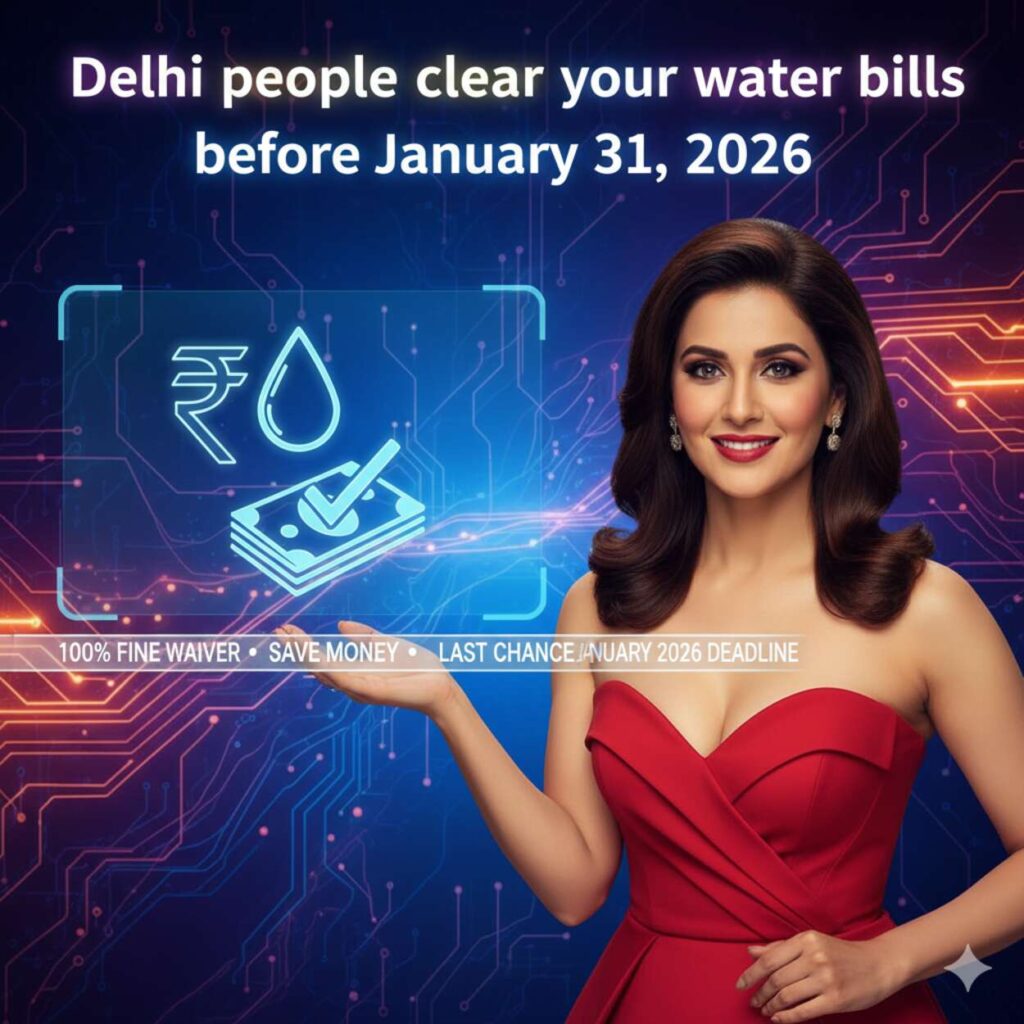
Table of Contents
Act Now! The Deadline to End High Water Bills is Fast Approaching
If you are a resident of Delhi and have been struggling with heavy or complicated water bills, this is the most important news you will read today. The Delhi government has launched a major relief scheme, giving domestic consumers a rare opportunity to settle their outstanding water bills and say goodbye to crippling fines and late payment charges. This incredible scheme offers a 100% waiver on late payment surcharges, but you must act fast. The final, non-negotiable deadline to benefit from this complete financial clean-up is January 31, 2026.
This amnesty program is specifically designed to help countless households who saw their original water bills balloon into massive, unmanageable amounts. Why did this happen? Because late payments on your water bills attract high compound interest, which quickly becomes the biggest part of the total due. Under this new plan, if you pay the main, original amount (the principal amount) that you owe for the water bills before the January 31, 2026, cut-off date, the government will completely remove all those accumulated interest and penalty fees. This is a chance to clear your name and your finances without the fear of huge fines. Don’t let this golden chance slip away.
The following table summarizes the waiver schedule for easy understanding:
| Deadline | Late Payment Surcharge Waiver |
|---|---|
| On or before January 31, 2026 | 100% Waiver |
| February 1, 2026 – March 31, 2026 | 70% Waiver |
| After March 31, 2026 | No Waiver |
The Amnesty Scheme: What You Need to Know
This scheme focuses on making life easier for domestic consumers who have long-pending dues. The Delhi Jal Board (DJB) has identified billions of rupees in outstanding water bills, and the vast majority of that amount—over 90%—is the late payment surcharge (LPS). This means the fines are much larger than the actual cost of the water consumed.
The main goal is simple: ensure that no family loses access to a basic necessity like water just because of a high fine on old water bills.
Key Benefits of the Waiver
- 100% Fine Waiver: If you pay the full principal amount of your outstanding water bills by January 31, 2026, all late payment surcharges (LPS), which is the heavy compound interest, will be completely waived off. You only pay for the water you used.
- Simple Payment Requirement: The benefit kicks in immediately once the full principal amount is paid. You can even pay this amount in installments, but remember, the zero-fine benefit will only apply after the last installment is paid and the principal is clear.
- Partial Waiver After Deadline: If you miss the January 31, 2026 deadline, there is a small window until March 31, 2026, where you can still receive a 70% waiver on the late payment charges. However, waiting means paying 30% of the fine, so it’s clearly best to act before the first deadline.
An Example to Understand the Relief
Imagine your original pending water bills amount (principal) is ₹5,000. Over time, the fines and interest (LPS) have grown to ₹45,000. Your total bill is currently ₹50,000.
- Action before January 31, 2026: You pay only ₹5,000. The remaining ₹45,000 fine is WIPED OUT completely.
- Action between Feb 1 – Mar 31, 2026: You pay the ₹5,000 principal plus 30% of the fine (30% of ₹45,000 = ₹13,500). Your total payment is ₹18,500.
As you can see, the difference is massive. Clearing your old water bills by the January deadline saves you significant money.
How to Clear Your Water Bills: Step-by-Step
The government has made the process of paying your outstanding water bills as easy as possible, offering both online and physical payment methods. You should have your Unique Consumer Number (KNO) ready for both processes.
Online Payment (Fast and Convenient)
- Visit the DJB Portal: Go to the official Delhi Jal Board website. You will find the payment option clearly marked.
- Enter Your Details: Input your unique Consumer Number (KNO), which is listed on your previous water bills.
- Check the Amount: The portal should show you the amount you need to pay under the amnesty scheme—this will be the principal amount only, if you select the scheme option.
- Complete Payment: Pay using any standard online method: UPI, debit card, credit card, Bharat Bill Payment System, or NEFT/RTGS.
Offline Payment (Personal Assistance)
- Find Your Office: Visit the nearest Zonal Revenue Office (ZRO) of the Delhi Jal Board.
- Required Documents: Make sure you carry your Aadhaar card and a copy of your most recent or old water bills.
- Get Assistance: Officials at the ZRO are trained to assist you. They will help calculate the exact principal amount due under the scheme and can guide you if you need to set up a short-term installment plan to clear the principal.
Important Links Related to Your Water Bills
Here are the official links you need to access information and pay your dues easily:
| Link Description | URL |
| Delhi Jal Board (DJB) Official Website & Online Payment Portal | https://djb.gov.in |
| DJB Customer Service Contact Page (For General Queries) | Delhi Jal Board Contact Information |
| Delhi Government Services Portal (For official scheme details) | Official Government of Delhi Portal |

Special Opportunity: Regularize Your Water and Sewer Connections
Alongside the amnesty for overdue water bills, the government has also launched a parallel scheme to regularize unauthorized water and sewer connections. This scheme is also valid until January 31, 2026.
For years, many people avoided regularizing their connections because the penalty fees were outrageously high. Now, those fees have been cut down drastically:
| Connection Type | Old Penalty | New Reduced Penalty |
|---|---|---|
| Domestic | ₹25,000 | ₹1,000 |
| Non-Domestic | ₹61,000 | ₹5,000 |
This is a crucial step toward ensuring that all households in Delhi get legal connections. Having a legal connection means reliable service and proper billing. After the January 31, 2026, deadline passes, the government has warned that they will begin taking strict action, including the disconnection of unauthorized services. This dual scheme—clearing your old water bills and regularizing your connection—offers a complete and clean start for residents.
Why January 31, 2026, is a Must-Mark Date
This financial relief is being called a ‘Diwali gift’ to the people of Delhi, reflecting a commitment to public welfare over mere revenue collection. While schemes like this do temporarily reduce the revenue collected by the Jal Board, the long-term benefit is huge: it modernizes the billing system, gets more people into the legal, formal system, and ensures better water governance.
Missing this specific deadline for your water bills means you lose the 100% waiver and will still be responsible for a portion of the penalty, even in the secondary window. After March 31, 2026, it is highly likely that standard, high-interest rates and full penalties will return, and the government will start intense collection drives and disconnections.
Do not gamble with this opportunity. If you have been worried about the high costs of your old water bills, or if you have an unauthorized connection, use the next few months to settle your dues. Visit the DJB website or your local ZRO today to check your principal amount and make a plan to pay it off completely before January 31, 2026. This one payment could be the difference between debt relief and continuing financial burden from those compound-interest-heavy water bills. Clear your water bills and secure your future water supply today.
Political Reactions and a Look Ahead
While the ruling party has hailed the decision as a much-needed relief for the public, the opposition Aam Aadmi Party (AAP) has criticized the scheme. AAP’s Delhi unit chief, Saurabh Bharadwaj, claimed that the initiative fails to address the core issue of “wrong bills” that were issued during the coronavirus pandemic . He argued that the government is only waiving the late fee but still demanding payment on the allegedly inflated principal water bills .
Despite the criticism, Water Minister Parvesh Sahib Singh reiterated that the decision was taken in public interest. He acknowledged that while it may result in a financial loss for the Jal Board, it will greatly benefit the public and is a key part of efforts to modernize the DJB, enhance sewer facilities, and work towards a cleaner Yamuna river .
For the residents of Delhi, this amnesty scheme on their water bills represents a crucial window to settle long-pending dues without the crushing weight of late fines. It is a final chance to start afresh and ensure uninterrupted access to clean water.
Disclaimer: The information provided in this article is for general informational purposes only. While we strive to ensure accuracy, the details regarding the water bill waiver scheme are subject to change based on official government and Delhi Jal Board directives. Readers are advised to consult the official DJB website for the most current information before taking any action. The views expressed are those of the author and do not necessarily reflect the website’s official policy.

